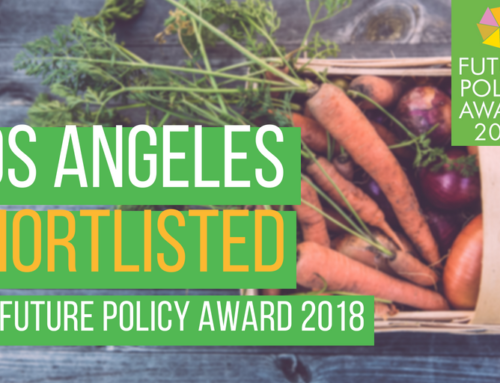LA School District Uses Its Spending Power to Support Local Farms, Workers’ Rights, and Kids’ Nutrition
J. Mijin Cha
We face two equally urgent and significant crises: rising inequality and climate change. Rising inequality is not only morally unacceptable; it also hinders economic growth. Climate change is already impactingevery part of the country, with low-income communities and communities of color getting hit first and worst. Fighting these two battles will require a fundamental economic shift that will push us to rethink how our economy is built and where it is grown. Building strong local economies combats inequality because it creates and maintains wealth in local communities, and is an underused tool in the fight against climate change.
Local economies can be strengthened by creating demand for goods and services through the large purchasing power of local institutions, such as local government and “anchor institutions,” like hospitals, universities, etc.
Instead of outsourcing services and goods to companies that are out of state or even out of the region, those institutions can look locally to meet their needs. Local businesses then spring up to meet that demand for food, services, and products, and wealth is created and maintained on the local level, which leads to more equitable, sustainable growth. Developing local economies is particularly important for low-income communities and communities of color, who suffer from underinvestment and a lack of resources.
In California the Los Angeles Unified School District, the nation’s second largest school district, uses its purchasing power to support small businesses and farmers, and encourage high-quality job creation. In 2011, the board of education made formal its preference for local products, those that originate within 200 miles. Shortly afterward, the school district signed the “Good Food Purchasing Pledge,” a cross-sector initiative developed by the Los Angeles Food Policy Council that looks to improve access to healthy, affordable, sustainable food. The L.A. city government has also signed the pledge.
Since 2011, the school district has doubled the percentage of its food budget that it spends locally, resulting in roughly $60 million redirected to local farmers, processors, warehouses, distributors, and workers. TheGood Food Purchasing Pledge is the first procurement policy—rules related to how organizations process goods and services—to tie better nutrition and local sourcing to local economic development, worker’s rights, fair wages, and workplace safety.
The strong purchasing power of the school district helps create jobs and keep resources within communities. For example, Buena Vista Food Products, located in Azusa, a largely Latino city in east Los Angeles County, doubled its business from a district order for 4 million servings of baked goods. Last year, the company created 100 jobs and invested $1 million in equipment.
Laura Trujillo, Buena Vista’s president, told the L.A. Times, “We haven’t sold this much in the history of our company. Working with L.A. [schools] has completely changed the way we purchase and produce.”
The procurement pledge ranks suppliers on a point system based on five categories: local economies, environmental sustainability, valued workforce, animal welfare, and nutrition. The more values a supplier practices, the higher the rank. Small local farms with fair-trade certification or social responsibility policies earn additional points, as do unionized farms or worker-owned cooperatives. A small, local, organic, unionized farm would score even higher. Points are also given to businesses run by women, people of color, and veterans.
“Our focus has been on public institutions that serve high-need populations,” said Alexa Delwiche, managing director of the L.A. Food Policy Council. “We’re trying to both transform the food supply chain and create good jobs, while also serving populations that have the least access to highest-quality foods.”
Other cities and states are also providing incentives for local purchasing.Forty-six states have passed or proposed some kind of farm-to-school legislation. L.A.’s pledge, however, goes beyond just farms and is the gold standard of using purchasing power to support local economies.
Changing how demand is created and where supply is provided keeps opportunity localized, which allows low-income communities and communities of color to participate in green entrepreneurship, job creation, and wealth building. As seen in Los Angeles, equitable growth through localizing procurement and economic development is good for the economy, communities, and the climate.





